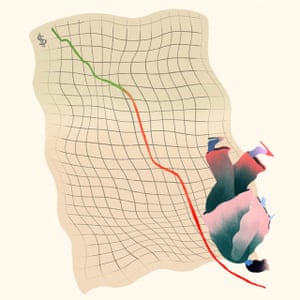Just as my career was taking off, I realized I couldnt manage my own money. The solution to my dilemma was not what I expected

On a warm spring day in March 2015, I fluttered around our family home with nervous energy. In one hour, I had a phone interview with one of Canadas largest newspapers, the Globe and Mail. As a budding freelance writer, I had pitched the story of my familys downsizing journey, hoping to get my first big assignment. Instead, one of Canadas most well-known finance reporters would be calling to interview me. Six months earlier, my husband and I, used to going against the grain in many ways, had chosen to leave our trendy home with natural sunlight, cherry-wood cabinets and fossil gray carpet, and move into an underground abode without a speck of color or luxury. The trade-off: we could finally afford diapers.
To pass the time before my interview, I read Sometimes I Like to Curl Up in a Ballto my two daughters. From my position, cocooned in their room, I had a view of the window that framed the feet of visitors walking down the steps toward our apartment.
Sometimes I like to curl up in a ball, so no one can see me because Im so small, I read aloud, my one-year-old and three-year-old curled into the crook of my arms, the words foreshadowing my own future emotions.
As I read, I noticed a familiar set of shoes passing by the basement-level window, and the kids and I raced to the front door.
Youre home early! I beamed at my husband, Daniel, tossing our youngest into his arms, excited about the chance to prepare for the interview. But Daniel stood eerily still, holding our one-year-old daughter, while our three-year-old clung happily to his leg.
Whats wrong? Are you OK? I asked, noticing beads of perspiration on his forehead.
He told me we should sit down, steering me to the couch, the tension between us escalating.
Your brother Jason died. He had a heart attack. Im so sorry.
I could feel my entire life changing with his words.
My middle brother, Aaron, had phoned Daniel at work, to make sure that he would be home to tell me the news. Numb, I called Aaron. He answered, and the gravel in his voice made me fall apart.
I cried hot, dripping tears. I asked questions you dont anticipate asking: why did it take so long to tell me? Would there be an autopsy? How long was he gone before someone found him? And then I finally asked him the question Id been dreading, not wanting to sound selfish or unfeeling: What am I going to do about my interview with the Globe and Mail?
Its an opportunity of a lifetime, Aaron reassured me.
By the time we ended our call, I had 15 minutes to pull myself together.
I splashed my face with cold water, rubbing away the tears and mascara stains. I brushed my teeth. The phone rang. Brianna speaking, I said, my voice even.
And for the second time in under an hour, my world tilted, my stomach went to mush, and my life changed forever.
For the next two weeks, my life was split in two. A few days after I found out my brother had died of a massive heart attack after a morning run, we welcomed a newspaper photographer from the Globe and Mail into our home.
The underground lighting was dim, so we took photos of our family playing in the yard outside, my laugh grating in my own ears. When the photographer left, I felt shame gnawing at the pit of my stomach shame at the smiling photo that would be seen across Canada, the broken and grieving sister hidden far from sight.
When the story was published, my inbox flooded with emails from across the country. The reporter, Rob Carrick, referred to me as a tiger mom of personal finance. His praise was an endorsement of sorts. This young woman knows what shes talking about, his words implied. Our savings at the time were impressive: by trading our townhouse for a basement apartment, we were saving around $600 every month. We were also curbing spending by keeping to a strict budget, which included no extensive travel, careful meal planning, using one vehicle with a low monthly payment of $200, and thrifting everything from clothes to toys to furniture. At the time, our family lived on $41,000 annually, and we still managed to put money into retirement savings and have a little bit left over for an emergency fund.
Carricks article captured many of our thrifty ways, including the specifics of our finances and how we managed to live within our limited means. Many of the emails I received were messages of approval from baby boomers. We werent stereotypical millennials, they said, flippant about money and unwilling to sacrifice. Our lifestyle reminded this ageing generation about the good old days of hard work and living within your means. I swelled with pride, because we were thriving, living our best life under the feet of our lovely landlords upstairs.
Over the next few months, I promoted myself as a personal finance guru, using the well-known newspaper article as my elevator pitch. I seized each opportunity, working late at night while my children slept in their shared bedroom, typing in the tiny office my husband had built for me inside of a closet.
But my newfound success didnt bring happiness or relief. I grieved for my brother and celebrated the first anniversary of launching my freelance writing career at the same time, wiping away tears while congratulating myself on a steadily growing list of publications. It had been a whirlwind year, and I couldnt find my feet: one part of me felt elated and enthused about the path my life was on, and then with a sudden crash, I would feel bereft lost and detached from the world.

One evening, I sat down with my husband to look over our finances, something I ironically hadnt been keeping up with.
Were $3,000 in debt. I think were too comfortable with the money youre earning, my husband said, the numbers sitting heavy on the sheet of paper I had scrawled them on.
I was establishing myself as a personal finance writer and had even been featured twice in Rob Carricks Best Reads in the Globe and Mail. But I couldnt manage my own finances, and that $3,000 felt like a sucker punch to the gut. While in retrospect, that amount of debt is fairly manageable, at the time I was billing myself as a personal finance writer who had zero debt and was on her way to financial independence. Instead, I had zero savings, a budget that wouldnt behave the way I wanted it to, and debt that was starting to snowball. I was proud of being a female personal finance writer, especially working in a male-dominated industry, and it was eye-opening to realize that personal finance wasnt as simple as the tricks I had been prescribing in my own writing.
Those numbers rolled around the back of my mind for months, causing me to stumble any time I focused on them. I wanted to get out of debt, and more than that, I wanted to feel financially stable and comfortable.
I tried everything to get a handle on our finances: pulling our children from the part-time daycare they attended, canceling subscriptions, making menu plans, and looking over our weekly budget on Fridays. I followed the basic principles I wrote about in my own personal finance articles, hoping theyd offer financial and emotional relief. Instead, our debt stubbornly remained. After a few months of trying to manage our finances, I was burned out, unable to juggle our goal of financial freedom, our family and home and my own deteriorating mental health.
Id once found joy in our nest of a basement apartment, but now the sounds of our landlords running water, playing the guitar, stomping up the stairs grated on my nerves. I needed peace, and no matter where I turned, I couldnt find it. My anxiety escalated, my nerves raw and frayed from constantly worrying about money, drained from child-rearing, and exhausted from avoiding the trauma and grief Id endured and refused to acknowledge.
I longed for peace, for that settled and contented feeling Id once had. Because Id become so unhappy in my home, I assumed that the house was the issue. I became hyper-focused on moving, believing that a change of scenery would change my mental health and outlook. I felt like I was buried six feet underground the abode no longer quaint, but suffocating.
After six long months of searching, we finally found an aboveground home. We left quiet suburbia and moved into a 1,000-sq-ft townhouse, in a historic neighborhood across the city. The streets surrounding us were lined with homes humming with character, lush parks with old trees, and fun spots where my kids could play, like a nearby childrens art studio. While we had finally found what we were looking for, we also had to pay a price: our new house was an additional $600 each month, plus the cost of utilities.
I justified this price by assuming Id be able to work more once my mental health improved. My husband and I also recognized the irony of our new home being exactly the same amount as what we had been paying previously for our first townhome. Looking back, neither of us regretted downsizing to the basement wed saved thousands over those years and made a home out of a little basement hideaway.
Surprisingly, moving on was more difficult than Id anticipated. Our new home didnt feel like a home to me. The kitchen cupboards were peeling, the linoleum was permanently stained yellow and the toilet wobbled when you sat on it.
By now, our debt felt like a cruel and unending joke. We had moved into a more expensive home with the hope that it would cure me of my misery. Instead, I felt unstable, and I stopped working, clinging to whatever else I could. That meant the very walls I hated, unable to escape them but too afraid to walk away from the fragile stability they provided. For the most part, I was housebound, refusing to go on walks or to the grocery store, preferring the security of the indoors.
I was consumed by an unnamed illness and our debt was only escalating, our income less than our expenses. We had moved to the townhouse with an expectation that my freelance writing income would fill in the gaps as needed, and without that money we were falling further into a pit of debt.
Nine months after moving into our new home, we welcomed a third daughter.
During my pregnancy, I was diagnosed with perinatal depression and put on medication, a decision that haunted me, as I feared I would be harming my daughter by taking antidepressants while her tiny body grew inside of me. When she was born, she was diagnosed with a heart condition, and she struggled to gain weight. Her first few weeks of life were a frenzy of appointments and anxiety. There was no time to rest or recover from her birth, not when her very life was at risk.

I blamed myself. I believed my failing mental health had caused her heart to form incorrectly, my figurative broken heart inherited literally. When my body wouldnt nourish her, I was convinced that my anxiety, stress and depression had consumed all of the milk inside me. When I was pregnant and depressed, I fought so hard to stay alive, and now that she was outside of my body I was failing at keeping her here.
At this time the money meant nothing. I spent how I needed to, willing to do whatever it meant to help my daughter survive, and to help me survive too. By her first birthday she was mostly thriving still a petite little girl, still struggling with gastrointestinal issues and weight gain, but I didnt feel like she was slipping away from me.
Christmas 2018, we celebrated under a faux tree, our three kids ripping open too many presents to count. We owed nearly $10,000 on our line of credit. With not enough money coming in and way too much money going out every month, I wondered if we would need to declare bankruptcy. We were running out of options, stuck with consumer debt that increased every single month. On top of our high cost of living, in a short period of time we got hit with multiple emergency bills. Our nearly new minivan required repairs, our daughter needed an expensive dental procedure, and my work laptop broke. Our debt was climbing, and none of the obvious solutions (ask for help, increase your income, cut your expenses) were an option for us. By now, our children were six, four, and 18 months, and I knew it was finally time to focus on me.
It was my husband who gave me the push and permission I needed to work on my mental health. Forget about the debt. You need help, he said, and thats when I knew that no amount of money-saving advice would save or heal me.
I started seeing a psychiatrist, ready to find help and healing for my inner demons. I was diagnosed with PTSD, depression, panic disorder and agoraphobia. Every single diagnosis felt like a new notch in my belt; I had earned this pain, and I finally had a reason for our mounting debt and the sense that I was drowning.
Sitting across from my psychiatrist every week, I began to face the angst Id covered over with printer ink. I grieved the untimely death of my brother. I stopped trying to stuff his death into a closet which didnt work anyway, because his absence seeped out under the cracks of the door and into my life.
As I grieved and processed my trauma, I started writing about mental illness, and my experience; sharing the pain in a productive way helped me to make sense of everything. My own sage advice from the early writing days didnt help me find financial security. What helped was finding ways to cope with a collection of mental health issues I had gathered like heavy rocks.
There was a gift wrapped up inside of the pain the ability to write again. This time my writing was honest and raw, and it helped dig us out of debt. In six months we managed to pay off 70% of our debt, and we hope to be debt-free soon.
I was a personal finance writer, and a series of traumatic events led me down a path of debt and near-bankruptcy. The answer to my financial crisis wasnt a book on money management or personal finance program; it was discovering the names of my mental illnesses, saying them aloud, and then finding a way to live with them.
This story originally appeared on the digital storytelling platform Narratively. Looking for more great work? Here are some suggestions:
Read more: https://www.theguardian.com/us-news/2020/jan/29/personal-finance-guru-broke


Recent Comments